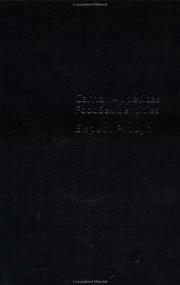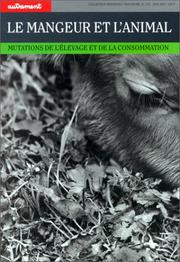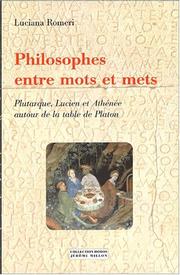| Listing 1 - 7 of 7 |
Sort by
|
Book
ISBN: 9781478011415 9781478010371 Year: 2021 Publisher: Durham : Duke University Press,
Abstract | Keywords | Export | Availability | Bookmark
 Loading...
Loading...Choose an application
- Reference Manager
- EndNote
- RefWorks (Direct export to RefWorks)
"Eating in Theory draws on snapshots of eating practices to shift a range of fundamental intellectual reflexes. The terms that shape current social science and humanities theorizing are marked by a hierarchical version of "the human" in which thinking is celebrated and eating is demoted to a mundane necessity. However much sense this may have made in the past, it works poorly in a time of ecological crisis. Drawing on ethnographic research into eating practices in the Netherlands, Eating in Theory re-thinks the core theory terms being, knowing, doing and relating. These are no longer external, distant, centered and companionable, but entangled, transformative, spread out and suspended between fostering and devouring"
Eating (Philosophy) --- Food --- Food habits --- Environmental aspects. --- Psychological aspects. --- Eating (Philosophy).

ISBN: 0415223040 0415223059 Year: 2000 Publisher: London : Routledge,
Abstract | Keywords | Export | Availability | Bookmark
 Loading...
Loading...Choose an application
- Reference Manager
- EndNote
- RefWorks (Direct export to RefWorks)
Book
ISBN: 1009321242 1009321226 1009321269 1009321234 Year: 2023 Publisher: Cambridge, United Kingdom ; New York, NY : Cambridge University Press,
Abstract | Keywords | Export | Availability | Bookmark
 Loading...
Loading...Choose an application
- Reference Manager
- EndNote
- RefWorks (Direct export to RefWorks)
In Edible Arrangements, Elizabeth Blake explores the way modernist writing about eating delves into larger questions about bodily and literary pleasure. Drawing on insights from the field of food studies, she makes dual interventions into queer theory and modernist studies: first, locating an embrace of queerness within modernist depictions of the pleasure of eating, and second, showing how this queer consumption shapes modernist notions of literary form, expanding and reshaping conventional genres. Drawing from a promiscuous archive that cuts across boundaries of geography and canonicity, Blake demonstrates how modernist authors draw on this consuming queerness to restructure a range of literary forms. Each chapter constellates a set of seemingly disparate writers working in related modes-such as the satirical writings of Richard Bruce Nugent, Virginia Woolf, and Katherine Mansfield-in order to demonstrate how writing about eating can both unsettle the norms of bodily pleasure and those of genre itself.
Book
ISBN: 9782753528888 9782869063136 2753528888 286906313X Year: 2013 Volume: *2 Publisher: Rennes: Tours: Presses Universitaires de Rennes, Presses universitaires François-Rabelais de Tours,
Abstract | Keywords | Export | Availability | Bookmark
 Loading...
Loading...Choose an application
- Reference Manager
- EndNote
- RefWorks (Direct export to RefWorks)
La monarchie perse, la tyrannie grecque, les monarchies hellénistiques sont toujours présentées par Athénée dans le contexte des banquets. Mais les thèmes qui se dégagent de ces récits – luxe ostentatoire, pratiques du don, relations entre convives, respect ou non respect des normes et des traditions – permettent d'aborder de manière bien plus large l'institution royale et ses représentations à travers l’histoire grecque. S'inviter à la table des rois avec Athénée devient ainsi le moyen d'esquisser une histoire des conceptions grecques sur la monarchie, tout comme d'éclairer des moments précis de l'histoire des monarchies.
Dinners and dining in literature. --- Eating (Philosophy) --- Repas dans la littérature --- Nourriture --- Athenaeus, --- Themes, motives. --- Repas dans la littérature --- Banquets --- Monarchie --- Aspect politique --- Athénée --- Critique et interprétation. --- Critique et interprétation

ISBN: 2862607150 9782862607153 Year: 1997 Volume: 172 Publisher: Paris : Editions Autrement,
Abstract | Keywords | Export | Availability | Bookmark
 Loading...
Loading...Choose an application
- Reference Manager
- EndNote
- RefWorks (Direct export to RefWorks)
Meat animals --- Eating (Philosophy) --- Animals --- Treatment --- Moral and ethical aspects --- Animal husbandry --- Bonding, Human-Pet --- Elevage --- Animal Husbandry. --- Bonding, Human-Pet. --- Calves --- France --- Preconditioning --- Beef cattle --- Cattle --- Quality --- Livestock --- Food --- Consumer protection --- Animal biotechnology --- Animal welfare --- Élevage. --- Human-Animal Bond. --- Meat animals - France --- Animals - Treatment - Moral and ethical aspects --- Animal Husbandry --- Human-Animal Bond

ISBN: 2841371409 9782841371402 Year: 2002 Publisher: Grenoble Millon
Abstract | Keywords | Export | Availability | Bookmark
 Loading...
Loading...Choose an application
- Reference Manager
- EndNote
- RefWorks (Direct export to RefWorks)
Eating (Philosophy) --- Dinners and dining --- Philosophy, Ancient --- Nourriture --- Repas --- Philosophie ancienne --- Philosophy --- Philosophie --- Plato --- Plutarch --- Lucian, --- Athenaeus, --- Philosophy, Ancient. --- Symposium (Classical Greek drinking party) --- History. --- History --- Classical Greek philosophy --- Classical Greek Philosophy. --- Symposium (Classical Greek drinking party). --- Plato. --- Symposion (Classical Greek drinking party) --- Drinking customs --- Ancient philosophy --- Greek philosophy --- Philosophy, Greek --- Philosophy, Roman --- Roman philosophy --- Dinners and dining - History. --- Dinners and dining - History
Multi
ISBN: 9781107039063 9781139856423 9781107516885 1107516889 1139856421 1107039061 1139892916 1107502551 1107501059 1107506484 1107514096 1107496985 1107503760 110843908X 9781139892919 9781107502550 9781107501058 9781107506480 9781107514096 9781107496989 9781107503762 Year: 2014 Publisher: Cambridge Cambridge University Press
Abstract | Keywords | Export | Availability | Bookmark
 Loading...
Loading...Choose an application
- Reference Manager
- EndNote
- RefWorks (Direct export to RefWorks)
David B. Goldstein argues for a new understanding of Renaissance England from the perspective of communal eating. Rather than focus on traditional models of interiority, choice and consumption, Goldstein demonstrates that eating offered a central paradigm for the ethics of community formation. The book examines how sharing food helps build, demarcate and destroy relationships - between eater and eaten, between self and other, and among different groups. Tracing these eating relations from 1547 to 1680 - through Shakespeare, Milton, religious writers and recipe book authors - Goldstein shows that to think about eating was to engage in complex reflections about the body's role in society. In the process, he radically rethinks the communal importance of the Protestant Eucharist. Combining historicist literary analysis with insights from social science and philosophy, the book's arguments reverberate well beyond the Renaissance. Ultimately, Eating and Ethics in Shakespeare's England forces us to rethink our own relationship to food.
Thematology --- English literature --- History of civilization --- anno 1500-1599 --- anno 1600-1699 --- Food in literature. --- Eating (Philosophy) --- Ethics, Renaissance, in literature. --- Dinners and dining --- Philosophy --- History and criticism. --- England --- Civilization --- Food habits --- Renaissance --- History. --- Eating --- Food customs --- Foodways --- Human beings --- Habit --- Manners and customs --- Diet --- Nutrition --- Oral habits --- Arts and Humanities --- Literature
| Listing 1 - 7 of 7 |
Sort by
|

 Search
Search Feedback
Feedback About UniCat
About UniCat  Help
Help News
News